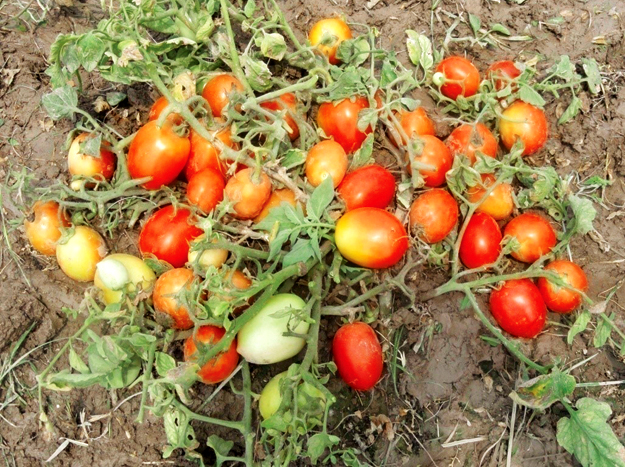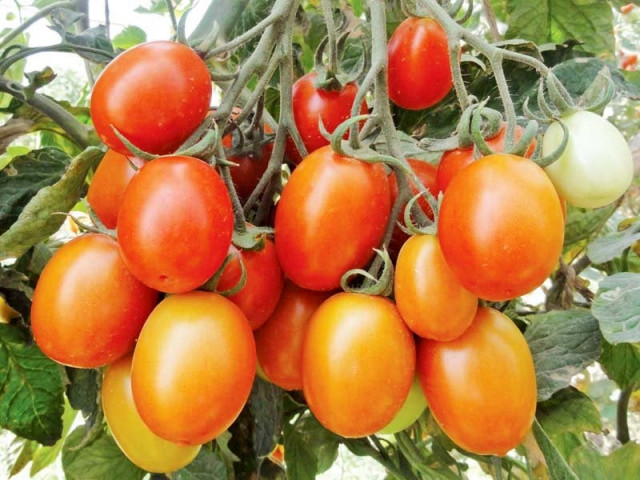Scientists engineer disease-resistant tomato varieties
The new crop will help overcome tomato shortage in odd seasons
Sundar Hybrid PHOTO: EXPRESS
FAISALABAD:
Scientists of the Vegetable Research Institute, Faisalabad have successfully developed two new varieties of tomatoes, the Sundar Hybrid (suitable for high tunnels) and Ahmar Hybrid (suitable for low tunnels and open fields). The team, headed by Dr Saeed Ahmad Chishti, Kashif Nadeem, Dr Muhammad Iqbal, Mudassar Iqbal, Muhammad Najeebullah, Khalid Mahmood and Dr Shahid Niaz, developed the new varieties.
Meanwhile, the Punjab Seed Council has also approved the new tomato varieties, which were developed under the funding of the Punjab Agricultural Research Board (PARB).
While giving details of the research project, Dr Chishti told The Express Tribune, “We submitted the project for financial assistance to the PARB.” He added, “The board pointed out that the country lacks high yielding and disease-resistant tomato varieties well suited for different seasons.”
Vendors continue to fleece citizens with exorbitant prices
He maintained, “A number of locally developed varieties are available with the growers. However, the situation is further aggravated due to non-existence of local tomato seed industry. The seed requirement is fulfilled from imported seeds.”

Ahmar Hybrid. PHOTOS: EXPRESS
Dr Chishti said, “As tomato is a mild season crop, therefore it is difficult to grow and produce them all the year round at one location under natural conditions due to extreme temperatures.”
He informed The Express Tribune that in Punjab, tomato is seeded and transplanted in the open field around mid-October and mid-November, respectively. “Under protected nursery sowing, seeding is done around mid-November and transplanted around mid-February when danger of frost is over,” he said.
“If there is no severe frost during December and January, then early transplanted crop gives excellent results.”
Pricey commodity: Tomato rates jump on supply woes
He elaborated that the crop’s excellent growth and fruit settings starts after mid-February and produce fruit in mid-March. Then it declines both in growth and fruit settings due to rise in temperature and diseases.
However, to overcome the problem of frost and poor fruit setting under low temperatures, a tunnel crop of tomato has been introduced. “This crop will help substantially to overcome the problem of tomato shortage during spring. But this crop is again dependent on costly imported hybrid seed,” Dr Chishti remarked.
On the other hand, he said, “The mid-February transplanted crop remains free from frost due to a shift in its transplanting time, but it gets very little time for vegetative growth as the plant enters into high temperature regime which affects growth. Consequently, this crop gives low yield.”
He said high temperature during early summer not only causes reduction in crop growth but also leads to forced maturity. He claimed that considering the present environmental and seed situation scenario, we developed tomato hybrids and open pollinated varieties which possess suitable characters with fair degree of tolerance against diseases.
While speaking to The Express Tribune, farmer Mian Muhammad Abid said, “I am in the business of tomato farming for almost 15 years. I import hybrid seed from various countries, including USA and China by spending huge foreign exchange.”
He added, “We have a huge demand of tomatoes in the local market especially by leading restaurants, foods chains and hotels. Therefore, we opted shed based farming to grow tomatoes even in odd periods to meet the demand in the market.”
“This shift has given us unbelievable financial benefits,” he maintained.
An owner of a fast food chain, requesting anonymity, told The Express Tribune, “Tomato has a huge demand locally. However, there are apprehensions among the growers that Indian tomato is being imported to Pakistan.” He said tomatoes are used in majority of the dishes so we should encourage its cultivation and give incentives to the growers.
Key facts
According to Food and Agriculture Organisation statistics:
• Pakistan is ranked on 34th position in annual tomato production in the world.
• Pakistan’s total annual requirement of tomatoes is 890,434 tonnes
• 67% tomatoes are produced locally while 33% is imported
• Tomatoes are grown on an area of 62,930 hectare
• Punjab produces 11% of country’s total tomato yield
Published in The Express Tribune, June 20th, 2017.


COMMENTS (1)
Comments are moderated and generally will be posted if they are on-topic and not abusive.
For more information, please see our Comments FAQ